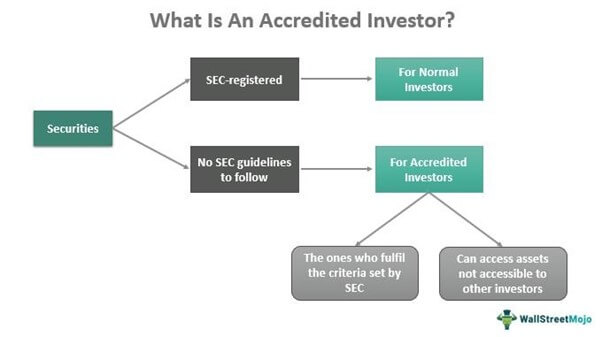What Is an Accredited Investor?
by siteadmin

Many investment opportunities are restricted to accredited investors. This includes early-stage start-up investments and commercial real estate crowdfunding. These types of assets are considered private placements and not registered with the Securities and Exchange Commission (SEC).
The purpose of these guidelines is to protect potential investors from risky ventures and losses they may be unable to bear. However, they also give those with large financial assets a major advantage over everyone else.
What Qualifies Someone as an Accredited Investor?
Individuals can qualify as accredited investors by proving pre-tax income of at least $200,000 in each of the past two calendar years (excluding the value of their primary residence) or by having a combined net worth of $1 million or more (excluding the value of their home). Couples who are both accredited investors can also become so by submitting joint financial statements that demonstrate this level of earnings or assets.
Companies that sell investments must register them with the Securities and Exchange Commission unless they fall under one of a few exceptions. One of those exceptions allows companies to sell unregistered securities to accredited investors, which can include alternative investments like convertible investments.
Individuals can also become accredited investors by being a partner, director or executive officer of a company that is offering a private placement. Additionally, businesses can also qualify as accredited investors by meeting certain asset or income requirements, including small business investment firms and rural business development companies.
What Types of Alternative Investments Do Accredited Investors Have Access to?
Alternative investments can boost your portfolio by diversifying it with assets that don’t correlate as closely to popular or mainstream asset classes. They also offer unique risk-reward profiles.
For example, alternative investments in tangible assets such as art or classic cars can increase in value and then be sold for a profit. Alternative investments can also include private market opportunities like early-stage startups or commercial real estate deals.
To qualify as an accredited investor, you must meet one of the following requirements:
Individuals must have a net worth of $1 million (excluding the value of your primary residence) or have annual income of at least $200,000 in each of the past two years (or $300,000 when combined with your spouse). Entities, such as businesses or trusts, must have assets of $5 million or more. You don’t receive a piece of paper or pass a test to prove you are accredited, but investment providers have their own processes for verifying that investors meet these guidelines.
How Do Companies Verify You Are an Accredited Investor?
The SEC requires that companies who are selling unregistered securities (private placements) to accredited investors verify their investor status. This is because these investments carry greater risk than those available to the general public, and the SEC wants to make sure that people who are purchasing these private placements have both the financial know-how and resources to weather the loss of an investment.
The verification process can include providing W-2 forms, tax returns, bank and brokerage statements, and credit reports. Investors also need to be able to prove that they earned over $200,000 in each of the past two years, or jointly with a spouse, and that they have a reasonable expectation of reaching that income level again this year.
Investors must also have a net worth of over $1 million, excluding the value of their primary residence. Additionally, individuals can qualify as an accredited investor by displaying that they have Series 7, Series 65 or Series 82 financial securities licenses.
What Are the Disadvantages of Alternative Investments?
The SEC defines accredited investors as those who can afford to invest in securities that don't require them to be registered. These investments often have higher potential risks and returns. They also don't have the same level of SEC oversight that regulated stocks and mutual funds do.
Individuals who meet the financial thresholds for accreditation (a combined net worth of $1 million or more, excluding the value of your primary residence, and an annual income of at least $200,000 over the past two years) can access private high-risk, high-return investment opportunities that aren't available to the general public. These include hedge funds and other private capital markets.
Alternative investments have low correlations to traditional securities and can help you diversify your portfolio. However, they can be more expensive and difficult to manage. They also require more active involvement from the investor. Additionally, they're often non-transparent and can be hard to verify the legitimacy of. This can lead to fraud and increased risk.
Many investment opportunities are restricted to accredited investors. This includes early-stage start-up investments and commercial real estate crowdfunding. These types of assets are considered private placements and not registered with the Securities and Exchange Commission (SEC). The purpose of these guidelines is to protect potential investors from risky ventures and losses they may be unable…
